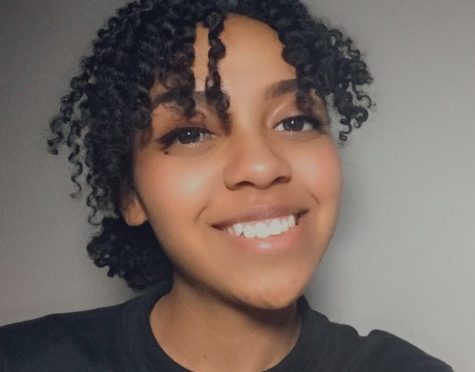It’s just hair
Black community condemned for afro-textured locks

Junior Andrea Penny’s box braids is just one of many executions of protective styles for textured hair. Photo submitted by Andrea.
March 10, 2021
Eurocentric beauty standards afflict society with disinclination towards textured hair of its diverse communities. From microaggressions to getting sent home from institutions, those with curlier hair experience race-fueled frustrations.
While inherently drier, the number of follicles in kinky hair makes it notably voluminous compared to its straight counterpart. Due to its fragile nature, hair care consumes considerable time, varying between people, yet it permits a plethora of styles to create and choose from. For those who cannot indulge in demanding care, they utilize protective hairstyles to prevent exposure and unwanted manipulation with box braids, dreadlocks, bantu knots, and more.
However, individuality attracts undesired reactions. Some schools and workplaces view styled, textured hair as unprofessional or inappropriate. In extreme cases, authority figures remove individuals from a building or group entirely.
Casey Jamerson, a cheer coach, removed Ottawa University student Talyn Jefferson from the team for wearing a bonnet, a protective hair cap, to prevent her braids from hitting teammates during practice; she is only one of countless cases. People of color experience hair related microaggressions; someone can touch their hair without permission or deliver a backhanded compliment by using “wild,” “crazy,” or “exotic” as adjectives. This effectively alienates and stimulates the fetishization of brown people.
Unjust criticism can cause people to conform to complacent hairstyles. The weight of the corporate lifestyle subjects primarily women with kinky hair to harsher standards, so the latter’s solution results in hair straightening, perms, or wigs. In response to race-fueled politics, California became the first of seven states to pass the 2019 CROWN Act that prohibits workplace discrimination that concerns hair style and texture.
As someone not afflicted with this issue, expressions of solidarity with marginalized groups best solidifies social progress. One can support efforts for liberation led by black leaders through monetary or moral endeavors for the natural hair movement and the like. Advocacy is found in promoting legislation for equality like writing to local and larger politicians to pass the CROWN Act in all U.S. states and territories. Self reflection also allows anyone to recognize if they ever partook in microaggressions and permits them the chance to correct behaviors.

